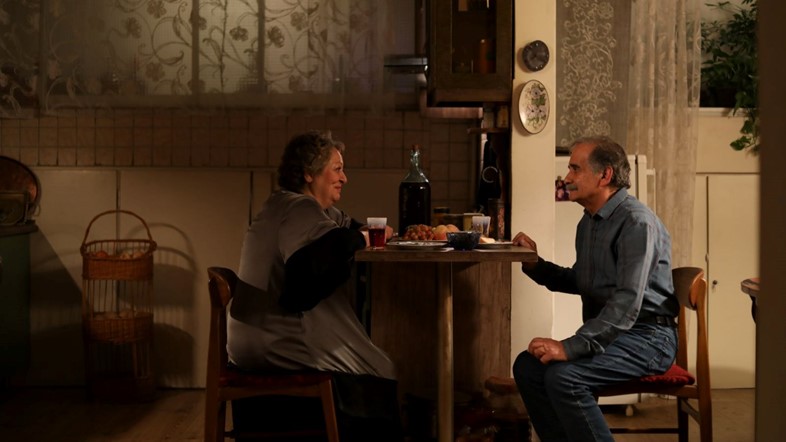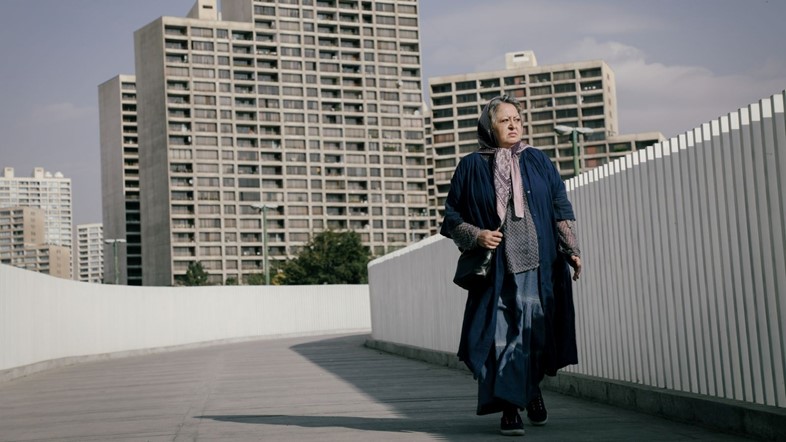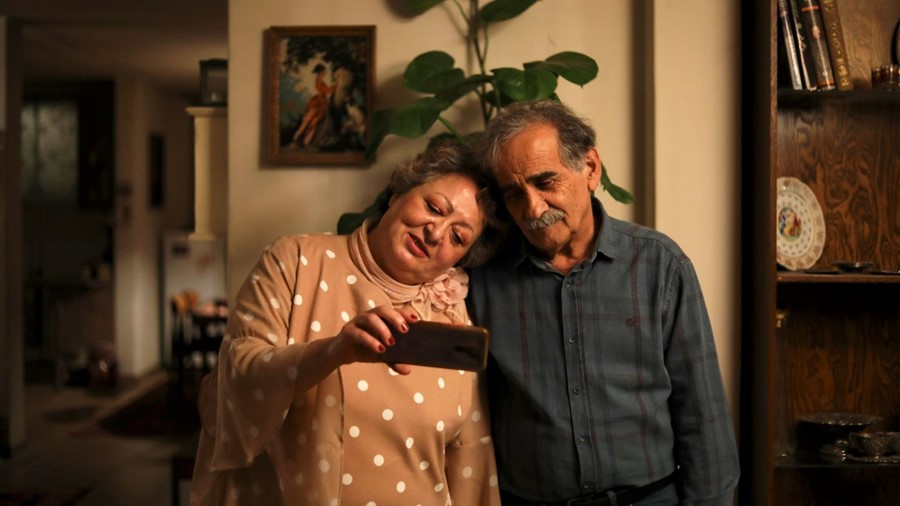Filmmakers Maryam Moghaddam and Behtash Sanaeeha open up on their bittersweet later-life romance, which packs a surprisingly political punch
In My Favourite Cake, Iranian duo Maryam Moghaddam and Behtash Sanaeeha have concocted a masterful film that’s hard to describe. Angry, funny and thought-provoking, My Favourite Cake is a crowd-pleasing rom-com (kind of) that is political, philosophical and experimental in its narrative structure. Above all, it’s truthful. “For the last 45 years, Iranian cinema has had to show Iranian women wearing a hijab inside their house, when they sleep, and when they wake up in bed,” says Sanaeeha, who wrote and directed the film with Moghaddam. “It’s a lie. We want to show how Iranian women really live.” Moghaddam nods, adding, “It’s a film about life, death, love, ageing and loneliness.”
Set in Tehran, the film follows Mahin (Lily Farhadpour), a 70-year-old widow who lives a solitary, partly nocturnal lifestyle. Occasionally, Mahin will speak on the phone to her daughter, who lives abroad and is distracted on calls; otherwise, she wakes up in the afternoon, then kills time by cooking, knitting and watching TV while the rest of Iran is asleep. In a defiant mood after catching up with friends, Mahin breaks the pattern by striking up a kinship with a taxi driver, Faramarz (Esmail Mehrabi), and sneaking him into her flat that same evening. A night of dancing and drinking ensues, with Mahin telling her nosy neighbour she’s mistaken if she thought she heard a man’s voice from her home. “When Lily read the script, she said, ‘I know it’s going to have consequences, but I’m ready for that,’” says Sanaeeha. “For Esmail, it was the same. All of us knew it would have consequences.”
Sanaeeha and Moghaddam, aged 44 and 54, are speaking to me in early September over Zoom from their living room in Tehran. (I was informed they’re not available before 1pm in their time zone. They confirm it’s because they, like Mahin, sleep from around 5am to 12pm.) Ideally, we’d be speaking in person, but the pair had their passports confiscated by the Iranian government last year. “They raided our editor’s house,” says Sanaeeha. “They took his hard drives, computers, everything. They watched the film and started interrogations.” However, the filmmakers, fearing this might happen, had already sent a copy of the dailies and rushes to France. “When we wanted to go to Paris to finish the post-production, they took our passports and gave us a travel ban,” says Sanaeeha. “The case has continued for almost a year. We can’t travel with the film. We can’t go to any festival or premiere.”
When My Favourite Cake launched at this year’s Berlinale, Moghaddam and Sanaeeha sent a statement to be read out, saying, among other things, “We feel like parents who are forbidden from even looking at their newborn child.” Another of the duo’s features, 2020’s Ballad of a White Cow, was banned in Iran, while Moghaddam was temporarily forbidden from leaving the country after starring in Jafar Panahi’s 2013 drama Closed Curtain. “You have to be prepared when you live in Iran,” says Moghaddam. “To get permission to shoot outside scenes, we applied for a short film under someone else’s name – not our name, because we knew we wouldn’t get permission – and even wrote a [fake] short film that the authorities would accept.” The cast and crew were warned of potential repercussions. “We told them, ‘If you think it’s worth it to be honest on a movie for the first time in 45 years, come with us.’”

In one outdoor scene, Mahin encounters a young woman on the street being arrested by the morality police for not properly wearing a headscarf. Mahin stands up for her, declaring, “You’d kill them over a few strands of hair?” In September 2022, after the script was written, Mahsa Amini, a 22-year-old Iranian woman, died in police custody after being detained for not fully covering her hair. “We were in the middle of shooting when Mahsa was killed,” says Moghaddam. “We were more motivated to go on with the movie. We were sad and angry. We thought the film was important because it’s about the life of Iranian women and their freedom. We, as filmmakers, have to make movies about the movement, about Iranian women, about society. We can come together and help society improve. It’s something that we’re all waiting for – a real change.”
According to Moghaddam, when Iranians have watched the film – they do so outside of Iran, usually at festivals – they’ve told the directors it’s “the very first film, after the revolution, that’s reality, and not lies about our life”. They are also pleased with the international response, given that their influences, as well as the Iranian filmmaker Abbas Kiarostami, include Jim Jarmusch, Richard Linklater, Wim Wenders, Mike Leigh and Nuri Bilge Ceylan. Sanaeeha notes he was intrigued by a review in the Guardian (five stars, of course) that compares the second half of My Favourite Cake to Before Sunrise. “That’s good,” he says. “We like that film, too.”
Once Mahin encounters Faramarz, the film does indeed unfold in what feels like real time. Whether it’s the taxi drive or the wine-drinking in Mahin’s home, the scenes soak up the playful conversation, the warm silences and also the paranoia that someone will interrupt their spontaneous hangout. “That little moment of joy, we have to cherish and seize it,” says Moghaddam. “It was important to go through the whole night, because that’s their only moment of happiness.” Sanaeeha agrees, noting, “We didn’t want to use a jump cut in these beautiful moments they have together.”

As for now, the duo’s travel ban still stands, and they’re unable to make a film in Iran until the court case regarding My Favourite Cake is closed. In the meantime, they’re writing scripts, one of which is a drama called Bouran. “If we don’t get permission to make that movie, we’ll probably do it outside of Iran,” says Moghaddam, who adds, with a dark chuckle, “if we get our passports.” The directors’ audacity extends to the final moments of My Favourite Cake, which is perplexing, even for many who otherwise adore the film. Moghaddam laughs in recognition. “We wanted to be honest, and not show people having fun all the time,” she says. “Life is full of misery. You have to seize the moments of happiness, because it’s all we have.”
My Favourite Cake, then, depicts Mahin and Faramarz consuming alcohol alongside a tantalising dessert baked by Mahin. “Drinking wine is a simple sign for enjoying life, which is why we put it in our story,” says Sanaeeha. “The cake is a metaphor for the sweetness of life.” Moghaddam concurs, bringing up the Iranian poet, Omar Khayyam, whose literature emphasises embracing the present tense. “He talks a lot about drinking wine and forgetting the madness of the world, because life is too short, and you’ll be gone forever, sooner or later,” she says. “Alcohol is forbidden in Iran, but Iranians drink it. It’s just being honest about life. By being honest, you face consequences. But that is life in Iran.”
My Favourite Cake is out in UK cinemas now.
